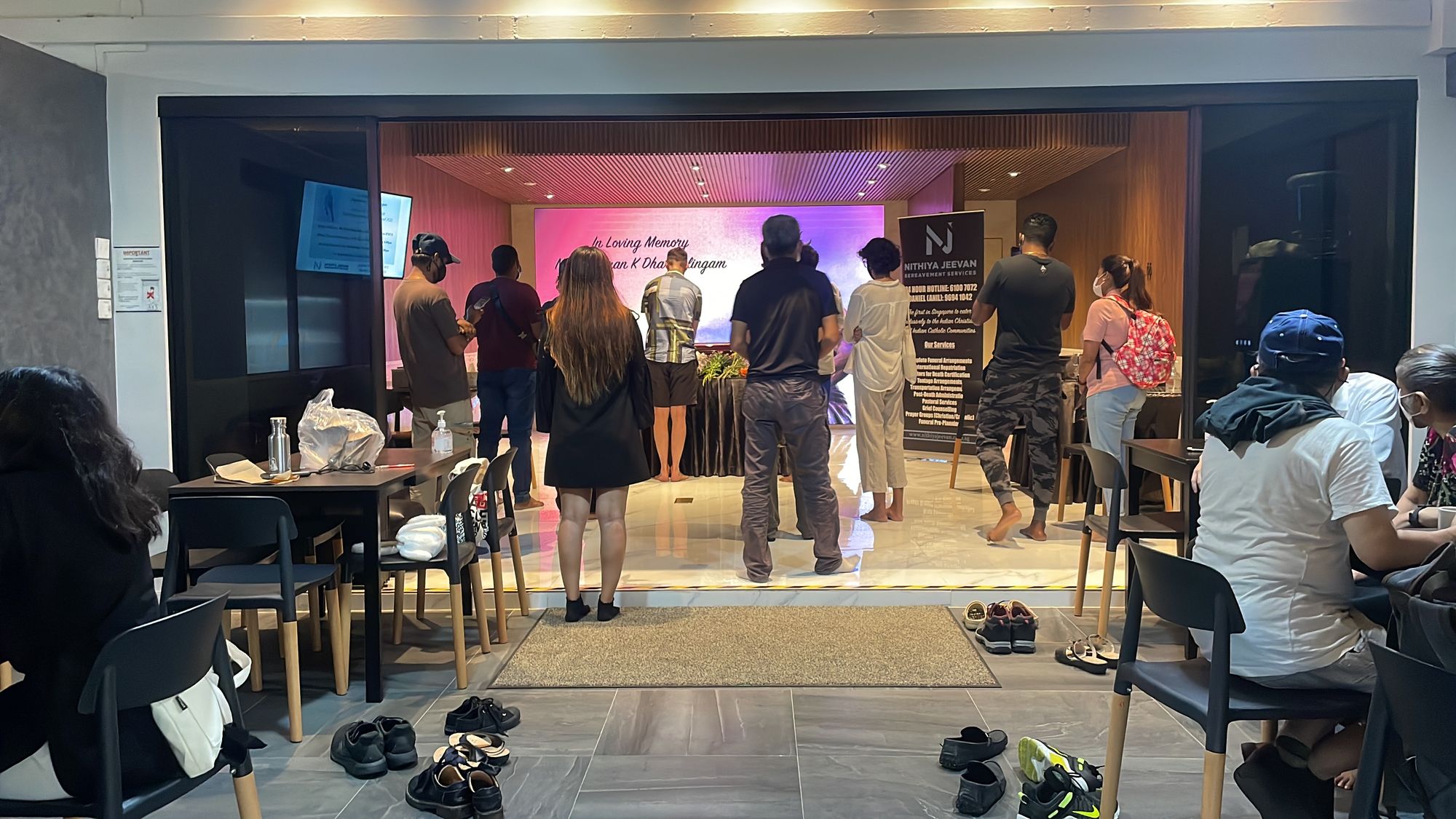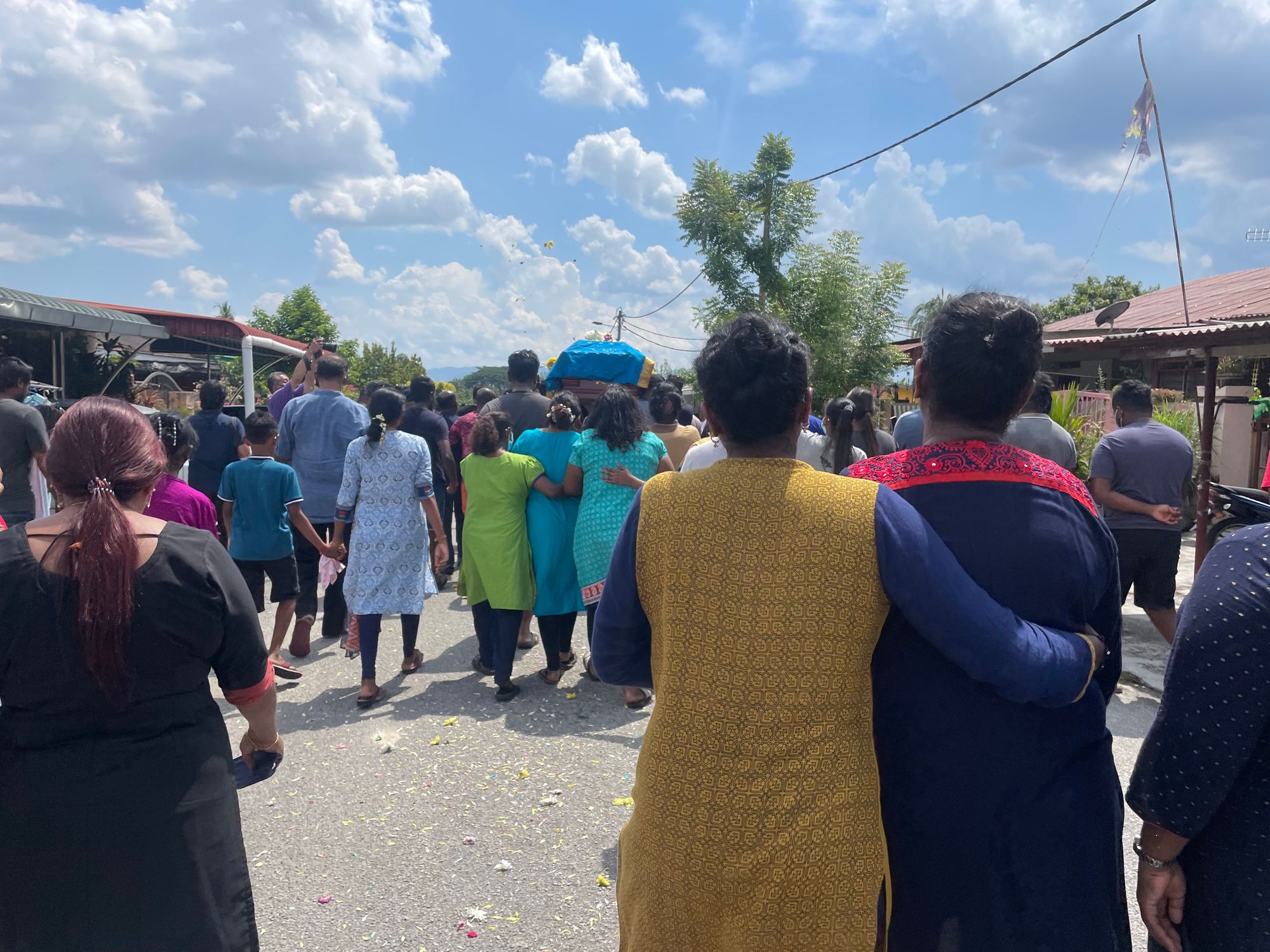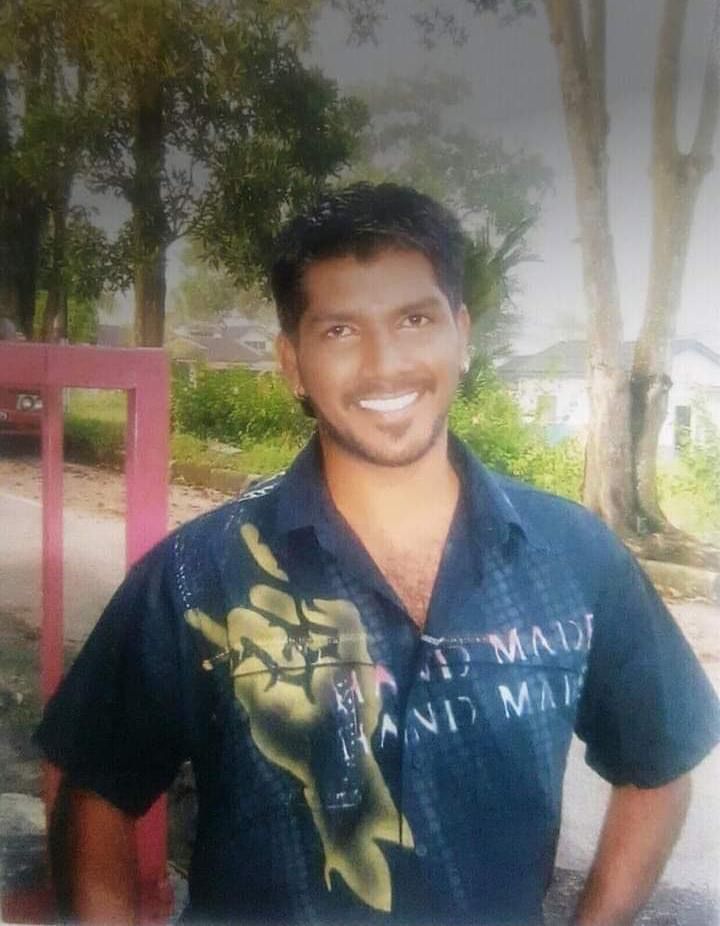You might feel like you’ve already read a lot about the death penalty in Singapore from this newsletter, but I can’t and won’t apologise for dedicating this issue to the subject again. It’s absorbed my entire past week, to the point where I honestly can’t write a weekly wrap about anything else because I barely know what else happened. I tried to do a quick scan to make up for it, but the truth is that this is a hugely important issue that hasn’t been reported widely or in depth by most Singaporean media outlets, and I can write about it from up close.
A mother’s lost Boy
Yesterday afternoon in Ipoh, I walked under a merciless sun in procession behind Nagaenthran’s casket. The air was full of the beating of drums, and the wails of Nagen’s closest and dearest family members. His seven-year-old nephew, still too young to grasp the horror of the violence that had been visited upon his family, clasped my right hand, and complained that the firecrackers were too loud. On my left was Sangkari, the sister of Pannir Selvam Pranthaman, another Malaysian prisoner on death row in Singapore. She had intertwined her fingers with mine, and we held on to each other tightly.
Sangkari took in the cries of the people around us, the family's anguish. She fixed her eyes on Nagen’s casket, adorned with flowers, carried on the shoulders of men from his family and community. Her own eyes redden with unshed tears. “Do they feel satisfied,” she said quietly, her voice a mix of sadness and rage, “now that they have hanged him?”
.
On Wednesday morning, about three hours after Nagen’s life was ended, 22-year-old Navin had to go to Changi Prison to claim his big brother’s body. Most of his family had already returned to Ipoh, where they could grieve together and wait to receive him. The only company Navin had was a cousin, waiting at the nearby petrol station with his motorbike.
As we waited for the memorial hall to be prepared for a short wake, Navin checked his phone. Nagen’s story had exploded all over TikTok. It was big news in Malaysia, and international media outlets were picking up on it too. “Reporters keep calling me,” he said.
I suggested writing up a statement that we could publish, or that he could copy-paste in a text message to every journalist that got in touch, so he wouldn’t need to deal with each call individually. He agreed.
“What would they want to ask me? How I’m feeling now ah?”
“We can start with that.”
Navin looks at me. “Miss... I cannot describe what I’m feeling.” Those are all the words he has. Just the afternoon before he’d seen his brother alive and well in court, touched him, watched him joke and laugh with his mother and aunt and cousins during their final visit. Now his brother is no more, put to death by people who’d been hired by the Singapore state for that purpose. What can anyone expect him to say?
I send that one line — “he says he can’t describe how he’s feeling” — to journalists who reach out to check if the family might be willing to comment on the execution.
.

Many people came to Nagen’s wake in Singapore. Some have followed his case since the prison’s first execution notice to his family hit the news. Others had only found out about his story more recently. Most have never met him. Still they came, and mourned. People brought flowers; someone who couldn’t make it had a bouquet delivered. People contributed money in envelopes with messages of condolences and comfort written on them. A Hindu priest showed up to lead prayers. When I thanked him for coming, all he said was, “We are all humans.”
Datchinamurthy’s family couldn’t attend the wake; they were visiting him in prison, still fighting for a chance for him to live. But they sent garlands of flowers for Nagen, to be placed inside his casket. A quick message, expressing support and condolences, had been scrawled on a piece of A5 paper. We saved the note and put it in the box with all the other messages that people had left for the family. A day later, in Ipoh, I showed it to Nagen’s sister Sarmila. She looked at it — it’s really little more than a scrap of paper — and pressed it to her heart. “I think I will keep this.” Even in the deepest throes of their grief, her family had been asking about Datchina all day, about whether he’d received a stay of execution, about whether he could have more time.
.
When I first see Mdm Panchalai in her home in Ipoh on Thursday, sitting by the casket with her oldest son in it, it’s like she’s aged a decade overnight. She sits in a daze, lost in her pain. A relative has to hold a bottle of water up to her lips to remind her to drink. When I take her hand, she reaches out and cries into my shoulder, just like she did when the Court of Appeal dismissed her last-ditch application — describing it as “frivolous” — and sealed her child’s fate.
The next day, she sits in the sweltering heat, staring at nothing, as her relatives cry over Nagen before the procession begins. She mouths the word “boy” over and over. Boy; it’s their term of endearment for Nagen. As the van starts up to begin the procession, two nieces have to hold Mdm Panchalai up, supporting her as Nagen is given his final send-off.
.
Years ago, a former death row prisoner told me that the euphemism they used on death row to refer to executions was “go back” or “go home”.
After 13 years behind bars in Singapore, Nagen finally went home on 27 April 2022. He was received by so many people who had known and cared for and loved him, who had longed for his return. He’d been separated from them for so long, all because of three tablespoons of heroin. For that, he’d paid with over a decade of torment on death row, and then with his life.
Yesterday afternoon in Ipoh, I walked under the merciless sun and watched Nagen’s family sob in one another’s arms.
Sangkari’s words ring in my ears:
Do they feel satisfied, now they have hanged him?

Datchina takes on the Attorney-General’s Chambers... and wins
On Thursday morning, Datchinamurthy sat down in front of a screen in prison, video-conferencing into a hearing in which he was expected to represent himself. On the other side was Deputy Senior State Counsel Yang Ziliang and State Counsel Pavithra Ramkumar. Facing off against these two legally trained professionals, Datchina read from his written submissions, arguing that his execution — scheduled for the next morning — should be stayed as he is party to an ongoing civil case.
He won.
Hearts lifted, then dropped as the Attorney-General’s Chambers quickly appealed the High Court’s decision, and obtained a Court of Appeal hearing right away. They ran the same arguments. There has been no detailed reporting, except from a lawyer who had rushed to the court to sit in on the hearing.
According to the lawyer’s notes, this is what Justice Andrew Phang said at one point:
“Once he is executed, it is the end, as far as I know. Are you willing to make the argument, knowing that that is the consequence. As Justice Prakash has said, we are not trying [the civil case that Datchina is part of]. There is no evidence taken. There has been no cross-examination. And that is where we are. This is not a hypothetical question that we sometimes pose in law school for learning, and you would know about that, because you went to law school, and it is a good learning exercise. Here we have a real life person, and you cannot ignore that. It might be slightly different if the consequences were not so dire, but given that they are so dire, frankly I am surprised that the AG is pursuing this appeal.”
Datchina won again. The AGC shamed themselves with their stubborn, bloodthirsty attempt to insist that he die on their schedule. There was no execution on Friday.
A stay of execution is not the end of the story. A death row prisoner with a stay of execution isn’t safe, only balanced on the edge of a precipice. Every moment is precious, and every moment needs to be put to good use to not just stay the execution, but halt it completely.
“Your government wants you to be afraid, don’t be afraid,” Datchina’s mother had said (through Kokila Annamalai) on Monday night to the assembled crowd at the vigil in Hong Lim Park for Nagen and her son. “They will try to stop you. Don’t stop.”

Please share this issue widely.
